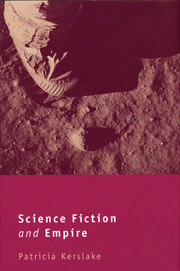Book contents
- Frontmatter
- Contents
- Introduction
- 1 The Self and Representations of the Other in Science Fiction
- 2 Resistance Is Futile: Silencing and Cultural Appropriation
- 3 The Word for World Is Forest: Metaphor and Empire in Science Fiction
- 4 Things Fall Apart: Relativity, Distance and the Periphery
- 5 Moments of Empire: Perceptions of Lasswitz and Wells
- 6 Exoticising the Future: American Greats
- 7 The Shape of Things to Come: Homo futuris and the Imperial Project
- 8 A Postcolonial Imagination: Kim Stanley Robinson's Mars
- 9 Beyond Empire: Meta-empire and Postcoloniality
- Conclusion
- Notes
- Bibliography
- Index
1 - The Self and Representations of the Other in Science Fiction
- Frontmatter
- Contents
- Introduction
- 1 The Self and Representations of the Other in Science Fiction
- 2 Resistance Is Futile: Silencing and Cultural Appropriation
- 3 The Word for World Is Forest: Metaphor and Empire in Science Fiction
- 4 Things Fall Apart: Relativity, Distance and the Periphery
- 5 Moments of Empire: Perceptions of Lasswitz and Wells
- 6 Exoticising the Future: American Greats
- 7 The Shape of Things to Come: Homo futuris and the Imperial Project
- 8 A Postcolonial Imagination: Kim Stanley Robinson's Mars
- 9 Beyond Empire: Meta-empire and Postcoloniality
- Conclusion
- Notes
- Bibliography
- Index
Summary
In his work Orientalism: Western Conceptions of the Orient (1978), Edward W. Said first academised the postcolonial notion of the Other. For there to be an ‘us’, he stated, there has to be a ‘not-us’, an Other, as both subjects define themselves through a mutual process of exclusion. In the demarcation of a place or centre for one culture or individual, there is an automatic displacement and marginalisation of all who stand outside or apart from that place. The opposition between ‘us’ and ‘them’, or between man and not-man (or ‘Un-man’ as C. S. Lewis called his malignant villain in Perelandra, 1943), achieves a central structural tension which inspires the very idea of ‘alien’. This notion holds true in all domains of SF, and is especially notable in those texts that invoke images of an imposed colonialisation. Said supported this, saying ‘we look for things described by the books so that we (in the end) do not see what is real, but what we choose to see as real’, a thought originally discussed by Francis Bacon in Novum Organum (1620). When we see what we think we ought to be seeing and extrapolate assumptions of behaviour based upon such fallacy, a form of ‘representation’ is produced. When one culture imposes its perceptions on another, in that it begins to see the Other not as they are but as, in Said's words, ‘they ought to be’, then the process of representation becomes inevitable: a choice is made to see a ‘preferred’ real.
- Type
- Chapter
- Information
- Science Fiction and Empire , pp. 8 - 24Publisher: Liverpool University PressPrint publication year: 2010

